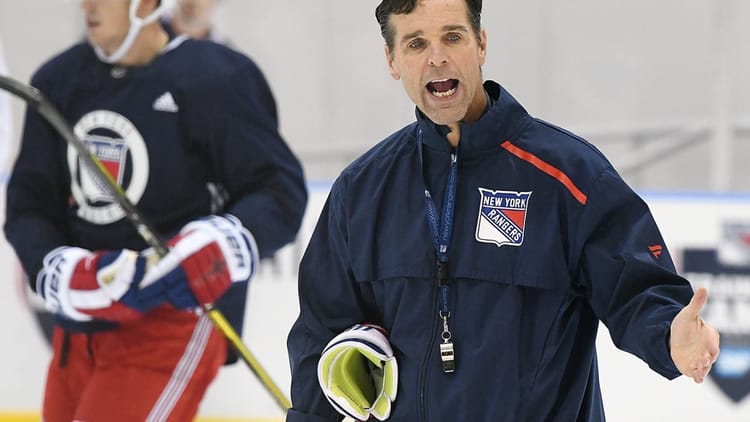
Yes, it’s a rebuild. Yes, the Rangers are a young team. Yes, it’s October. But it should not be this bad.
The Rangers are 3-5-1 with a goal differential of -5. They have a couple of impressive wins under their belt as well: the exhilarating opening night triumph over Winnipeg, and last week’s comprehensive 6-2 drubbing of a strong Buffalo Sabres team. But other than that, it’s been mostly bad. Off the charts bad, and historically bad for this era, as noted by Rob L. and Dave yesterday.
There have been stretches of play so desultory that the puck never seems to reach the opposing team’s zone, let alone land on the stick of a Ranger with a chance to score. The data agree with the eye test. The Rangers have been held to 9 or fewer shot attempts at even strength in 11 of their 27 full periods played (not counting a 3-on-3 overtime where they literally never touched the puck). There have been 7 periods out of 27 where the Rangers have earned 25% or less of the Expected Goals share. All data below from Natural Stat Trick is 5v5, score and venue adjusted.
- 2nd Period vs. Winnipeg: 18.22 xGF%
- 2nd Period vs. Ottawa: 22.94 xGF%
- 2nd Period vs. Edmonton: 17.39 xGF%
- 1st Period vs. Washington: 19.59 xGF%
- 3rd Period vs. Washington: 13.68 xGF%
- 1st Period vs. Arizona: 14.15 xGF%
- 2nd Period vs. Boston: 11.56 xGF%
It’s one thing to have periods like this once or twice a month, but the Rangers are getting run off the rink – conceding quantity and quality without generating anything offensively – on a near nightly basis. These types of results are likely what an AHL team would get if they were suddenly dropped into an NHL game.
These awful performances cannot be pinned solely on Lindy Ruff or Marc Staal, either. Rather, they are the result of an entire team that’s lacking in confidence both individually and collectively. And when the issues are that systemic, there’s only one place to look: the head coach.
David Quinn was brought in because of his reputation for developing talent. His extensive college hockey experience was supposed to enable him to get through to young players, and provide an environment in which they could learn and augment their strengths, but also compete and eventually win. So far this season however, Quinn has not put his young players in position to succeed. Instead, he has marginalized young talent in favor of veterans, and done little more (at least publicly) than demand that everyone try harder. Any perceived lack of effort (or, according to Vitali Kravtsov, a heart rate below 180 beats per minute) or mental mistake often results in an immediate benching and re-shuffling of the forward lines that have already been thrown in the blender so many times that Tom Renney and John Tortorella are blushing.
Alarmingly, Kaapo Kakko looks lost under Quinn’s watch after supremely confident performances against pros in Finland and against NHL players last May at the World Championships. Lias Andersson, who seems to play the exact style that Quinn pleads for, can’t ever seem to find more than 6 or 7 minutes of even strength hockey in a game. Adam Fox has stood out, but is currently tasked with dragging the corpse of Marc Staal around every shift.
This type of behavior from NHL coaches is nothing new or unique, but that doesn’t justify it either. What makes it difficult to stomach is that the decisions to lean on veteran players has not led to better results, even though the coach seems to believe they do (or will).
Yes, the Rangers are young, but this summer they loaded up on bonafide NHL talent by signing Artemi Panarin and trading for Jacob Trouba. They have experienced NHL players in Mika Zibanejad, Chris Kreider, Jesper Fast and even Pavel Buchnevich and Brady Skjei who are meant to provide a steady foundation for the kids. But the tentativeness with which many of those players have approached this season so far is yet another indictment of the head coach. This is their second year in Quinn’s system, yet there seems to be even less cohesion and decisiveness than last year.
The question now is this: when will John Davidson will step in? He did not hire David Quinn. JD is a jovial guy when he’s doing an interview with his old buddy Sam Rosen, but niceties do not make you an effective hockey executive. Davidson will eventually decide whether Quinn’s approach and the overall state of affairs are having a negative impact on the young players, particularly Kaapo Kakko. If he thinks so, then Quinn may find himself job hunting sooner rather than later.
Share:
More About:Coaching
